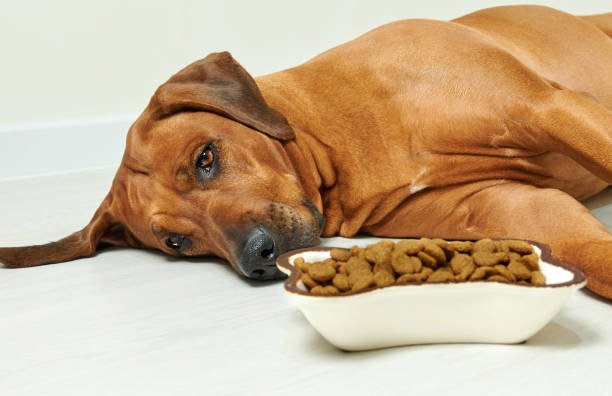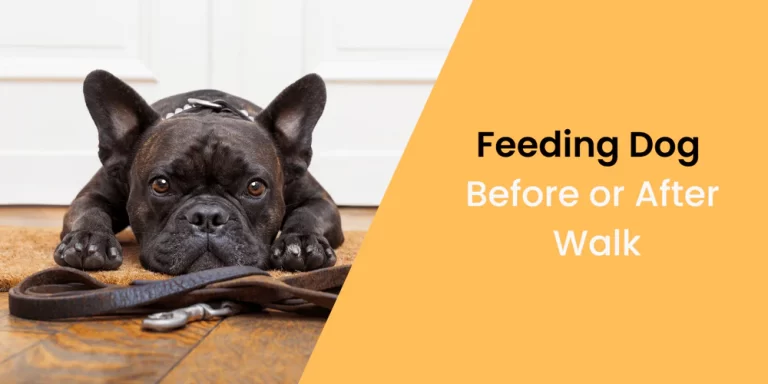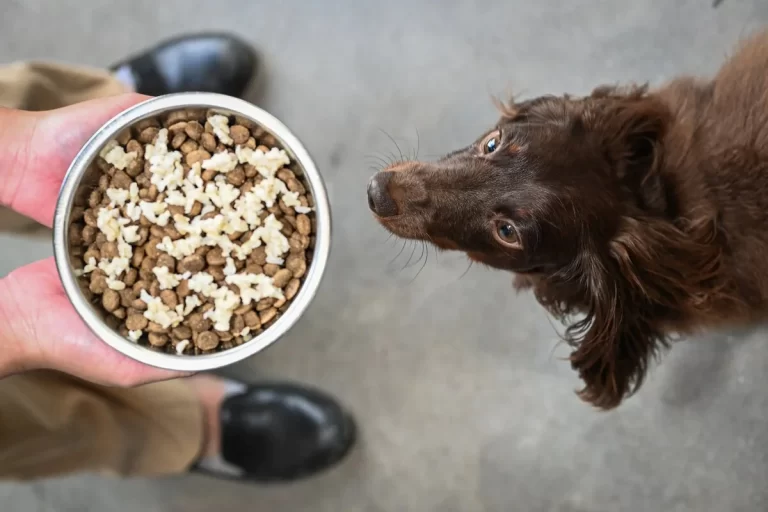What To Do If Your Dog Has Food Poisoning
How do you help a dog with food poisoning?
If you suspect that your dog has food poisoning, it’s crucial to take quick action to help your pet. Food poisoning in dogs can lead to various symptoms, including vomiting, diarrhea, lethargy, and dehydration. Here are steps to assist a dog with food poisoning:
- Identify the Cause: Determine which food or substance may have caused the poisoning. This information can be helpful for your veterinarian in diagnosing and treating your dog.
- Contact Your Veterinarian: Get in touch with your veterinarian or an emergency vet clinic as soon as possible. Describe your dog’s symptoms and follow their guidance. They may recommend bringing your dog in for an examination and treatment.
- Hydration: Offer your dog access to clean, fresh water. Dehydration is a common concern with food poisoning, so encourage your dog to drink. If your dog is unable to keep water down, consult your veterinarian for guidance on rehydration.
- Withhold Food: Temporarily withhold food for at least 12-24 hours to allow your dog’s stomach to settle. This can help reduce vomiting. However, continue to provide water.
- Bland Diet: After the fasting period, offer a bland diet to help soothe your dog’s stomach. A common bland diet is boiled rice and boiled, skinless, boneless chicken (plain and without seasoning). Small, frequent meals are best to avoid overloading the stomach.
- Monitor Symptoms: Keep a close eye on your dog’s condition. If vomiting or diarrhea persists or worsens, or if you notice any other concerning symptoms, such as blood in the stool or severe lethargy, contact your veterinarian immediately.
- Follow Your Vet’s Advice: If you’ve already consulted with your veterinarian, be sure to follow their prescribed treatment plan and any medication instructions.
- Prevent Future Incidents: Identify the source of the food poisoning and take steps to prevent your dog from accessing harmful substances in the future.
It’s important to remember that some types of food poisoning can be severe and even life-threatening for dogs. If you’re unsure of the cause or severity of your dog’s symptoms, err on the side of caution and seek immediate veterinary care. Prompt treatment can be critical in managing food poisoning and ensuring your dog’s well-being.
Additionally, if you suspect that your dog has ingested a toxic substance, such as a chemical or medication, contact a poison control hotline (e.g., the ASPCA Poison Control Center) or your veterinarian for guidance on how to address the specific toxin.
How long does food poisoning last in dogs?
The duration of food poisoning in dogs can vary depending on the specific cause, the severity of the contamination, and the overall health of the dog. Food poisoning, also known as gastroenteritis, can result from the consumption of contaminated food, water, or other substances. Common symptoms include vomiting, diarrhea, lethargy, and abdominal discomfort.
In many cases, mild cases of food poisoning may resolve within 24 to 48 hours with proper care. However, more severe cases or those caused by certain pathogens may last longer and may require veterinary intervention. Here are some general guidelines:
- Mild Cases:
- Mild cases of food poisoning may lead to symptoms such as occasional vomiting and diarrhea. With proper home care, including a temporary shift to a bland diet (e.g., boiled chicken and rice) and providing plenty of water, improvement may be seen within a day or two.
- Moderate to Severe Cases:
- If the symptoms are more severe, persistent, or if there’s blood in the stool, it’s crucial to seek veterinary attention promptly. Severe cases may require treatment with medications, fluid therapy, and possibly hospitalization.
- Identifying the Cause:
- The duration of food poisoning can also depend on the specific pathogen responsible. Bacterial, viral, or parasitic infections may have different courses and require specific treatments.
If your dog is showing signs of food poisoning, it’s important to:
- Withhold Food Temporarily: Allow the digestive system to settle by withholding food for a short period. Gradually reintroduce a bland diet as recommended by your veterinarian.
- Provide Water: Ensure your dog has access to clean and fresh water to prevent dehydration.
- Consult a Veterinarian: If symptoms persist or worsen, seek veterinary advice promptly. Your veterinarian can perform diagnostic tests, identify the cause, and recommend appropriate treatment.
Never attempt to treat severe cases of food poisoning at home without consulting a veterinarian, as prompt and accurate diagnosis and treatment are essential for a successful recovery. Additionally, certain pathogens that cause food poisoning can be zoonotic, meaning they can be transmitted from animals to humans, so it’s crucial to practice good hygiene and take appropriate precautions.
What should I feed my dog if he has food poisoning?
If you suspect that your dog has food poisoning or is experiencing gastrointestinal upset, it’s advisable to withhold regular dog food temporarily and transition to a bland diet. A bland diet is easier on the digestive system and can help alleviate symptoms such as vomiting and diarrhea. Here’s a simple recipe for a bland diet that you can feed your dog:
Bland Diet Recipe for Dogs:
- Ingredients:
- Boiled Chicken: Cook boneless, skinless chicken breasts or thighs. Boil the chicken until it’s thoroughly cooked, and there are no pink areas. Avoid using any seasonings, spices, or oils.
- White Rice: Cook white rice separately. It should be well-cooked and easily digestible.
- Preparation:
- Shred the boiled chicken into small, easily digestible pieces.
- Mix the shredded chicken with an equal amount of cooked white rice.
- Feed small, frequent meals throughout the day.
Feeding Instructions:
- Feed small portions of the bland diet (about 1/4 to 1/2 cup for smaller dogs and 1/2 to 1 cup for larger dogs) every 4-6 hours.
- Gradually reintroduce the regular dog food after a day or two of the bland diet, transitioning back over several days.
Additional Tips:
- Water: Ensure your dog has access to plenty of fresh water to prevent dehydration. Hydration is crucial, especially if there has been vomiting or diarrhea.
- Monitoring: Monitor your dog’s condition closely. If symptoms persist or worsen, consult with your veterinarian promptly.
- Veterinary Consultation: It’s important to consult with a veterinarian if your dog shows signs of food poisoning or gastrointestinal upset. A veterinarian can provide a proper diagnosis, recommend appropriate treatment, and rule out more serious conditions.
Remember that this bland diet is intended for short-term use as a temporary measure during episodes of gastrointestinal upset. If your dog’s symptoms persist or if there are concerns about their health, seek veterinary advice promptly for a thorough evaluation and appropriate treatment.
Can dogs survive food poisoning?
Most dogs can recover from mild cases of food poisoning, especially if the underlying cause is identified and addressed promptly. However, the severity of food poisoning can vary, and certain pathogens or toxins can pose a more significant threat to a dog’s health. Whether a dog can survive food poisoning depends on several factors:
- Underlying Cause: The specific cause of food poisoning, whether it’s bacterial, viral, or parasitic, can impact the severity of the condition.
- Timely Veterinary Intervention: Seeking veterinary care promptly is crucial. Mild cases of food poisoning may resolve with home care, but more severe cases may require medical attention, including diagnostics and appropriate treatment.
- Dehydration: Vomiting and diarrhea, common symptoms of food poisoning, can lead to dehydration. Severe dehydration can be life-threatening, so it’s essential to address fluid balance.
- Type of Toxin: Certain toxins, such as those produced by certain bacteria or molds, can be more potent and may require specific treatments.
- Overall Health of the Dog: The general health and age of the dog can influence their ability to recover. Puppies, elderly dogs, and dogs with underlying health conditions may be more vulnerable.
If you suspect your dog has food poisoning or is showing signs of gastrointestinal upset, consider the following:
- Withhold Food Temporarily: Withhold regular dog food temporarily and transition to a bland diet (e.g., boiled chicken and rice) to allow the digestive system to settle.
- Provide Water: Ensure your dog has access to clean and fresh water to prevent dehydration.
- Consult a Veterinarian: If symptoms persist or worsen, seek veterinary advice promptly. Your veterinarian can perform diagnostic tests, identify the cause, and recommend appropriate treatment.
While many dogs recover from mild cases of food poisoning with proper care, it’s crucial to be cautious and not underestimate the potential severity of the condition. Timely veterinary intervention is key to ensuring the best possible outcome for a dog affected by food poisoning.
Can dogs recover from food poisoning on their own?
In some cases, dogs may recover from mild cases of food poisoning on their own with proper home care. However, the severity of food poisoning can vary, and it’s important to monitor your dog closely and seek veterinary attention if symptoms persist or worsen. Here are some general guidelines:
Mild Cases:
- Withholding Food: Temporarily withhold your dog’s regular food for about 12-24 hours to allow their digestive system to settle.
- Bland Diet: Transition to a bland diet, such as boiled chicken and rice, in small, frequent meals. This is easy on the digestive system.
- Hydration: Ensure your dog has access to clean and fresh water at all times to prevent dehydration.
Watch for Improvement:
- Monitor Symptoms: Keep a close eye on your dog’s overall condition, including any changes in behavior, appetite, and bowel movements.
- Rest: Allow your dog to rest and avoid strenuous activities during the recovery period.
When to Seek Veterinary Attention:
If your dog’s condition does not improve or if you observe any of the following signs, it’s important to consult with a veterinarian promptly:
- Persistent Vomiting or Diarrhea: Continuous vomiting or diarrhea can lead to dehydration and may indicate a more serious issue.
- Dehydration: Signs of dehydration include lethargy, sunken eyes, dry gums, and reduced skin elasticity.
- Blood in Stool: If you notice blood in your dog’s stool, it may indicate a more severe issue that requires veterinary attention.
- Weakness or Lethargy: If your dog becomes weak, lethargic, or unresponsive, it’s a sign of a more serious condition.
- Loss of Appetite: A prolonged loss of appetite can indicate an underlying problem that needs veterinary evaluation.
- Pre-existing Health Conditions: Dogs with pre-existing health conditions or compromised immune systems may be more susceptible to severe outcomes and should be evaluated by a veterinarian.
While mild cases of food poisoning may resolve with home care, it’s important to exercise caution and not delay seeking veterinary attention if your dog’s condition raises concerns. Food poisoning can have various causes, including bacteria, toxins, or parasites, and the specific treatment required may depend on the underlying issue. A veterinarian can perform diagnostics, identify the cause, and recommend appropriate treatment to ensure the best outcome for your dog.
How do you flush poison out of a dog’s system?
If you suspect that your dog has ingested a poisonous substance, it’s crucial to seek immediate veterinary attention. Flushing out toxins from a dog’s system should be done under the guidance of a veterinarian, as the specific treatment will depend on the type of poison involved. Attempting home remedies without professional advice can be risky and may delay appropriate medical intervention.
Here are some general steps you can take if you suspect poisoning in your dog:
- Contact a Veterinarian:
- Call your veterinarian or an emergency poison control hotline immediately. Provide as much information as possible about the suspected poison, the amount ingested, and your dog’s symptoms.
- Do Not Induce Vomiting Without Guidance:
- Do not attempt to induce vomiting unless directed by a veterinarian. Inducing vomiting can be harmful in certain poisoning cases, and specific guidelines should be followed.
- Follow Veterinarian’s Instructions:
- Follow any instructions given by the veterinarian or poison control hotline. They may advise on whether or not to induce vomiting, what substances to administer, or other emergency measures.
- Collect Information:
- Collect any packaging or material related to the poison to provide information to the veterinarian.
- Transport to the Veterinarian:
- If advised by the veterinarian, transport your dog to the veterinary clinic as quickly as possible. Time is critical in cases of poisoning.
- Provide Supportive Care:
- Follow any additional instructions from the veterinarian for supportive care. This may include administering activated charcoal, which can help absorb toxins, or providing intravenous fluids.
- Monitor Vital Signs:
- Keep a close eye on your dog’s vital signs, including breathing, heart rate, and temperature. Report any changes to the veterinarian.
It’s important to note that the approach to treating poisoning can vary based on the specific toxin involved. Some poisons may require specific antidotes, while others may be treated with supportive care.
Never attempt to treat poisoning at home without professional guidance. Even if you believe the substance ingested is non-toxic, it’s essential to consult with a veterinarian to ensure the safety and well-being of your dog. Emergency poison control hotlines, such as the ASPCA Animal Poison Control Center (APCC) or the Pet Poison Helpline, can provide immediate guidance and should be contacted in case of suspected poisoning.
How can I treat my dogs poisoning at home?
I’m not a veterinarian, but treating poisoning at home is not recommended. If you suspect that your dog has ingested a poisonous substance, it is crucial to seek immediate veterinary attention. Home treatment can be risky and may delay appropriate medical intervention, which can be life-saving.
Here are important reasons why you should not attempt to treat poisoning at home without professional guidance:
- Varied Toxicity: Different substances have different toxicities, and the appropriate treatment depends on the specific poison involved. What works for one type of poisoning may not be effective or may be harmful for another.
- Inducing Vomiting Can Be Harmful: Inducing vomiting is not always the appropriate response to poisoning, and it can be harmful in certain cases. For example, some corrosive substances can cause additional damage if vomited.
- Incorrect Treatment Can Worsen the Situation: Providing the wrong treatment or delaying appropriate medical care can worsen the situation. Poisoning cases require careful diagnosis and management by a veterinarian.
- Antidotes and Supportive Care: Some cases of poisoning may require specific antidotes that only a veterinarian can administer. Additionally, supportive care, such as intravenous fluids or medications, may be necessary.
- Professional Evaluation and Monitoring: A veterinarian can conduct a thorough examination, perform necessary diagnostic tests, and monitor your dog’s condition. This is crucial for determining the severity of the poisoning and providing appropriate care.
If you suspect your dog has ingested a poisonous substance, take the following steps:
- Contact a Veterinarian: Call your veterinarian immediately or an emergency poison control hotline, such as the ASPCA Animal Poison Control Center (APCC) or the Pet Poison Helpline. Provide information about the suspected poison, the amount ingested, and your dog’s symptoms.
- Do Not Delay: Time is critical in poisoning cases. Follow the guidance given by the veterinarian or poison control hotline, and transport your dog to the veterinary clinic as quickly as possible.
Remember, the information provided here is not a substitute for professional veterinary advice. Always consult with a veterinarian for guidance on the specific situation involving your dog.
What are signs of food poisoning in dogs?
Food poisoning in dogs can manifest with various symptoms, and the severity can range from mild to severe. If you suspect your dog may have ingested something toxic, it’s crucial to monitor for signs of food poisoning and seek veterinary attention promptly. Here are common signs of food poisoning in dogs:
- Vomiting:
- Persistent or recurrent vomiting, especially if it contains blood or appears to be violent, can be a sign of food poisoning.
- Diarrhea:
- Diarrhea, which may also contain blood or mucus, is a common symptom of food poisoning. Frequent and severe diarrhea can lead to dehydration.
- Lethargy:
- A dog with food poisoning may become lethargic, weak, and less responsive than usual. Lethargy is a common sign of illness.
- Loss of Appetite:
- A sudden loss of interest in food or a decreased appetite can be indicative of a gastrointestinal issue, including food poisoning.
- Abdominal Pain:
- Dogs with food poisoning may experience abdominal pain or discomfort, which can manifest as restlessness, pacing, or a hunched posture.
- Excessive Salivation:
- Excessive drooling or salivation can occur in response to nausea or discomfort associated with food poisoning.
- Dehydration:
- Vomiting and diarrhea can lead to dehydration. Signs of dehydration include sunken eyes, dry gums, lethargy, and reduced skin elasticity.
- Fever:
- In some cases, dogs with food poisoning may develop a fever. Elevated body temperature can be an indication of an inflammatory response.
- Tremors or Seizures:
- In severe cases or with certain toxins, neurological symptoms such as tremors, seizures, or ataxia (loss of coordination) may occur.
- Difficulty Breathing:
- Some toxins can affect the respiratory system, leading to difficulty breathing or other respiratory distress.
It’s important to note that the signs of food poisoning can vary based on the specific toxic substance ingested. If you suspect your dog has ingested something toxic or if they exhibit any of the above signs, contact your veterinarian immediately. In case of an emergency, you can also call an emergency poison control hotline, such as the ASPCA Animal Poison Control Center (APCC) or the Pet Poison Helpline, for guidance. Early intervention is crucial for the best possible outcome.






